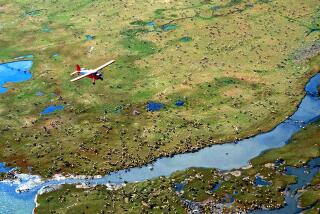Don’t Drill the Arctic; Look to the Future
- Share via
Re “Bush Plan Calls for Increase in Oil Production,” Feb. 24: Politics continue to hide the larger picture associated with drilling in the Arctic National Wildlife Refuge: the people. The Gwich’in Indians still practice a traditional lifestyle of hunting and fishing, and to this day caribou are the most important food source for them. It is a part of who they are. Environmental standards are very different for proponents of development than for those who have no vested economic interest in exploiting the oil.
I would like to ask President Bush about the number of oil spills we know about and their effects on our fragile northern ecosystem. Who will explain to the children yet unborn why the world we have left them is so damaged and will remain so for centuries? How so little oil in the ground was worth so much that we allowed one of the last wild places on Earth to be destroyed? We should be concentrating most on conservation and working to integrate alternatives to burning fossil fuels into our lives instead of pursuing this destructive path. It isn’t just land and animals in jeopardy, it’s a culture.
Andrea McNeill
Woodland Hills
*
I opened Sunday’s Times to read of the Bush plan to drill in the Arctic refuge to increase oil production. Later, I read in our local paper that our president is calling for a reevaluation of land space presently set aside for an endangered bird, the California gnatcatcher. Still later, I switched on C-SPAN and heard Nevada Gov. Kenny Guinn (a Republican) as he spoke of how upset Nevadans were about the Bush plan to send nuclear waste to Yucca Mountain, about 150 miles from populated areas. Apparently the government has not bothered to file an environmental impact report for this tremendous undertaking. Nevada is suing the federal government.
One wonders if the commander in chief isn’t using his wartime status to achieve domestic ends.
Sydell Stokes
Valencia
*
In your article our options for an energy policy are presented as more production versus conservation. And conservation is limited to more-efficient refrigerators and fuel-efficiency requirements on SUVs. Why is there no discussion of the benefits of smart growth and a federal role in encouraging it?
If, instead of low-density sprawl that can never be served efficiently or effectively by transit, new development simply had a commercial core surrounded by concentric circles of housing with ever-lower densities, we would achieve significant savings in terms of oil use. And we would still be providing a wide range of housing options. On the other hand, if we force every household to have two or three cars to survive, we are going to get the resulting pollution, traffic congestion and growing dependence on imported oil. (We’ve gotta face it that the OPEC nations have oil reserves that dwarf what is left in the U.S. and Canada.)
Ken Niemi
San Francisco
More to Read
Get the L.A. Times Politics newsletter
Deeply reported insights into legislation, politics and policy from Sacramento, Washington and beyond. In your inbox twice per week.
You may occasionally receive promotional content from the Los Angeles Times.










